Inside the Wells Building
Step inside the 15-story high-rise, which was the largest terra cotta building in the world when built in 1901.
Step inside the 15-story high-rise, which was the largest terra cotta building in the world when built in 1901. Back to the full article.


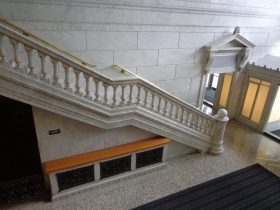
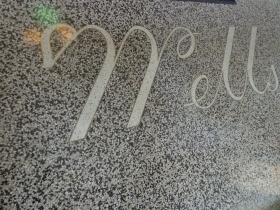
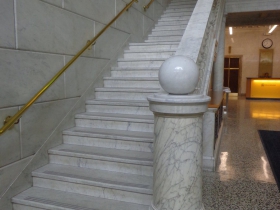
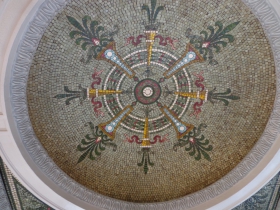
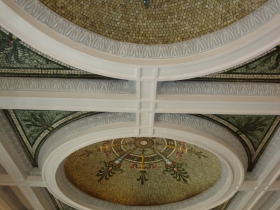





















Where is the picture of the outside of the building? I went through about 20 pictures of boring inside office shots before finally giving up. After a nice written description of the building, I was looking forward to having the “aha” moment of tying the story with the building……………
Angela, the original building with all of it’s glorious terra cotta mentioned in the article is no more, but the lower floors remain as handsome as the few remaining examples of Milwaukee’s ‘earlier’ city buildings go.
Links to original views of the Wells Bldg. at the MPL site:
http://content.mpl.org/cdm/singleitem/collection/HstoricPho/id/276/rec/11
http://content.mpl.org/cdm/singleitem/collection/HstoricPho/id/274/rec/5
http://content.mpl.org/cdm/singleitem/collection/HstoricPho/id/278/rec/4
Better views of the Wells Bldg.:
http://content.mpl.org/cdm/singleitem/collection/HstoricPho/id/1020/rec/18
http://content.mpl.org/cdm/singleitem/collection/HstoricPho/id/1016/rec/20
@Gary Thanks!
This story misses the most interesting part of building: the basement. This site was the original home of the Milwaukee Athletic Club (MAC). The basement includes remnants of the MAC’s massive marble showers, baths and steam rooms for the then all-male private club, and is an interesting vignette into turn of the century club life. Last time I was down there many of the original hand painted signs were still evident. When I inspect a building I usually find the most interesting stories are in the basement.
Sad to see the original lighting being replaced by mediocre fluorescent lights that leech away so much of the building’s charm. At least the owner can leave the original fixtures in place in hopes that a future, and more enlightened, owner will restore them to their former glory. Kind of makes me think about how the original Grain Exchange room had been “improved” into oblivion, though much less so here.
And if this is a feature for Doors Open Milwaukee, why on earth are several pictures devoted to the retrofit, bland, brand new office spaces that are covering over the original features of the building? Doesn’t it — like the fluorescent lights in the hall — make a silent commentary on how the owner disrespects the original appeal of this building?
The covering of legacy rooms is part of the renovation, save the building by covering or, worse, gutting it. This is unfortunate. I bumped into that reality in a DO tour of the Wisconsin Gas building. however, that being said, there are two perches (corners: SE and SW, visible from the street) on the gas building at about 10 or 15 floors that provide spectacular views – where the visitors spent most of their time. Hopefully we can get upstairs and outside.
Pardon how specific I’m being here but a source for the “largest terra cotta building in the world when built” for the Wells Building should be confirmed. I mention this because I’ve looked for a source but haven’t found one. I saw this on the Doors Open website too. All I’ve found is on a different building, the Pabst. In the article, “Milwaukee” written by William F. Hooker, published January 1903 in the Machinist’s Monthly Journal Vol XX, page 362 states that the Pabst Building in 1892 was the largest office building in the world built wholly of iron and terra cotta. Perhaps someone confused the Pabst Buliding for the Wells Building as later on the page Hooker talks about Daniel Wells Jr.
Pardon again! I wrote a typo – in Volume XV. Here is a link on Google Books: https://play.google.com/books/reader?id=Q8EUAAAAYAAJ&printsec=frontcover&output=reader&hl=es&pg=GBS.PA362
I saw this building last year at DO. It is a huge “yawn”. Don’t waste your time, unless you want the views mentioned in a previous post. In fact, the views from the USBank building are better.
I believe a beautiful historic building such as the Wells Building should never be redeveloped into a office building. Office workers will lose their enthusiasm of seeing the beauty day after day, much like seeing the Grand Canyon or Niagara Falls if you worked across the street. Reuse of the buildings as a hotel causes a new impression for each hotel guest and some may return often just to feel the history these buildings provide.